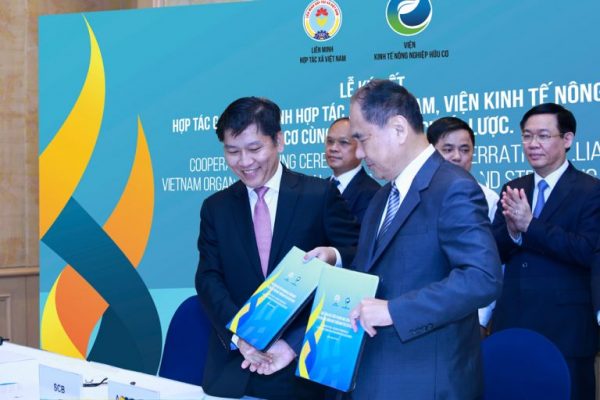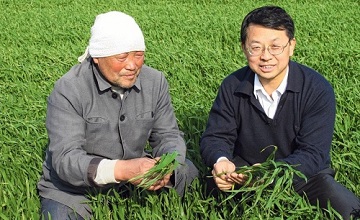From an IT background, but life has led Pham Ngo Quoc Thang to agriculture. Thereby, from the concerns on agricultural products, he has brought Vietnamese vegetables into the global market.

 The fact that Vietnamese products have failed in our own land is a pity for anyone who are dedicated to agriculture, including the businessman, Mr. Quoc Thang. Though being an agricultural and tropical country, Vietnam’s fruits and vegetables are still in grown in home-scales.
The fact that Vietnamese products have failed in our own land is a pity for anyone who are dedicated to agriculture, including the businessman, Mr. Quoc Thang. Though being an agricultural and tropical country, Vietnam’s fruits and vegetables are still in grown in home-scales.
The technology key
Start-up with the project of milk tea and coffee, from many working trips to Korea, the 8X young man has envisioned a big market for Vietnam’s vegetables. With further analysis, Thang recognized the common weak points of our domestic agricultural products: poor planting area standards, scattered planting areas that make high transportation costs, high preservation costs and high loss rate, farmers’ products were questionable about safety, outdated processing technology, and last but not least, poor marketing and communication. These are the reasons that foreign partners have not considered Vietnam’s agricultural products.
From this exact status analysis, Thang started to make a business plan on processing agricultural products for export. His approach includes investigating the strict requirements of the international market and then finding ways for Vietnam’s products to meet those requirements. “So far, we have produced products and then finding the market. This journey is quite risky because of the big gap between our products and the requirements of the market. Our approach is that, first doing market analysis, listening to the needs from the market, then organizing production. The market will direct what we should do, how the quality should be,” Pham Ngo Quoc Thang, Chairman of the Management Boad of Lavifood, said. The key of this requirement is the word “technology”!
In 2014, Lavifood was born in Long An. It was the first time that a Vietnamese business boldly invested in equipments from Europe for the whole process. In addition, Lavifood has applied international standards for quality management such as đISO 22000: 2005, HACCP, KOSHER, BRC and HALAL. Applying high technology in agricultural product processing is an important process for Lavifood to complete its agricultural value chain.
After only a year of operating, Lavifood exported more than 10 thousand tons of products including many kinds of fruits to strict markets such as the U.S.A, Australia, Japan, Korea, the Europe…
“Previously, the world considered Vietnam as a less safe agricultural area, because of its outdated farming practices and the abuse of pesticides. Lavifood has understood the strict requirements about safety and has built the value chain from seedlings, material area, processing, packaging and transporting. In order to make the best quality products, beside technology, the company signed off-take agreements for farmers’ assurance,” Mr. Pham Ngo Quoc Thang said.
Leadership vision
In fact, value chain is a market-oriented economic model, in which one of the important factors is the leadership vision from the high level to the local level on agriculture to direct the development of the material area.

 Pham Ngo Quoc Thang presenting about the agricultural value chain and Lavifood at the forum in Dong Thap, December 2017.
Pham Ngo Quoc Thang presenting about the agricultural value chain and Lavifood at the forum in Dong Thap, December 2017.
After Long An, Lavifood has expanded towards Tay Ninh, the province that is cherishing the dream of becoming “the Vietnam’s capital of agricultural products”. In the strategy for high technology agricultural development, Tay Ninh has set aside 1,800 ha of land for agricultural value chain investors. Tay Ninh has committed to raise the GDP per capita in agricultural sector from 1,500 USD/year up to 5,000 USD/year.
The provincial leaders did not hesitate to invite leading experts for consulting, developing local human resource training together with maximum supporting policies for enterprises. Over the last year, Tay Ninh has invited experts from the Institute of Organic Agricultural Economics and the Fulbright research group for analysing the situation to find out the strong and weak points of the province. And they have decided to bet on high technology agriculture. Catching that desire of the boundary land, Lavifood has boldly invested 1,500 billion VND in Tanifood factory, which will start operating this year. The factory’s capacity is up to 60 thousand tons of products per year. If operating at the maximum capacity, Tanifood can reach the revenue of 200 million USD/year.

 Pham Ngo Quoc Thang introducing about the coming Tanifood factory in Tay Ninh
Pham Ngo Quoc Thang introducing about the coming Tanifood factory in Tay Ninh
Lavifood has rapidly assured local farmers by signing off-take agreements of the two main products which are passion fruit and pineapple in Tay Ninh. According to the agreements which is valid since July 2017, Lavifood buy all the passion fruits which are classified after harvesting on the area of 124 ha of the 3 farmers Nguyen Van Con (Thanh Binh commune, Tan Bien district), Doan Van Huu and Nguyen Thanh Cuong (Thanh Dong commune, Tan Chau district) with the fixed price of 8,000 VND/kg (delivering the products at the factory).
Lavifood is also committed to buying the pineapples on the area of 200 ha of Mr. Nguyen Van Sau (Binh Thanh commune, Trang Bang district) and 35 ha of pineapples of Mr. Duong Thanh (Loi Thuan commune, Ben Cau district) with the fixed price of 6,000 VND/kg (for more than 1kg per pineapple) and 4,500 VND/kg (for less than 1kg per pineapple). Beside, the company also buy other products such as grapefruits, mangoes, guavas…in the local area.
“Local management and business management both have to take pay attention in proper policies for development. I hope that the government, the state and the provinces will support and facilitate about funding, banking policy for enterprises to invest more in high-tech and human resources for agriculture. Then, Vietnam’s agricultural products may more easily approach the global market,” Mr. Quoc Thang shared his thought.
Dominating the market
On September 17, 2015, Lavifood had an important event: Chairman of the Hyundai group from Korea, Mr. Chung Mong-Hyuck, came to visit the factory and sign the contract of buying the agricultural products. In May 2016, of mangoes alone, Lavifood signed the 1 million USD contract with Semiwon Food company (from Korea).
Shaking hands with Hyundai and Semiwon Food to bring Vietnam’s fruit into the Korean market is not the random thing happened to Lavifood on a beautiful day. It is the result of a whole process by the young entrepreneur Mr. Pham Ngo Quoc Thang, including investigating about standards and requirements of the market for organizing production. The hand-shaking with Hyundai is an important mark for today, Lavifood has opened door to many other strict markets such as American, European markets… “Lavifood produces high quality products with lower price to serve the little lower segments. Then, we will create a strong trademark to compete with big competitors from other countries. When the free-trade agreements are formed in the years 2020 – 2025, we will have the trademarks which are strong enough to reach out to the world. That is the reason why we set the first priority for technology,” Mr. Quoc Thang outlined a long-term route. According to Mr. Thang, the vision of Lavifood is reaching the first position in Vietnam, top 5 in Asean, top 10 in Asia and top 20 in the world on vegetable processing in the next 10 years.
The world market, literally is a big market, always full of people who buy and people who sell with strong competitive capacity. Among that market, Mr. Quoc Thang came and studying about the demands and requirements, observing the methods of producing, buying and selling and then finding out the ways to meet those needs. His approach does not only bring benefits for Lavifood but also create the big and deep changes in the farming practices, in mindset on agriculture of the local farmers in the areas where Lavifood collaborates, thereby creating improvement in economic effectiveness for the farmers.
In 2017, the Vietnam’s vegetable sector grew 40.5% compared to the year 2017. The export turnover reached approximately 3.45 billion USD, higher than rice export although the planting area was only 40% in comparison to the rice planting area. The important thing to say here is that although we reached the record, we currently still occupy just 1% the vegetable world market. Among that vast market, the opportunity for Vietnam’s vegetables, for Lavifood of Mr. Pham Ngo Quoc Thang, to expand further their presence is huge.
Source: Nha Quan Ly Magazine (2018)

 Tiếng Việt
Tiếng Việt




